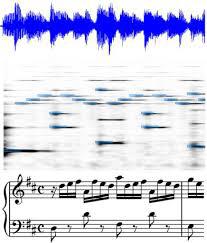Search Results for author: Geoffroy Peeters
Found 16 papers, 8 papers with code
Degradation-Invariant Music Indexing
no code implementations • 1 Mar 2024 • Rémi Mignot, Geoffroy Peeters
Finally, anchoring the analysis times on local maxima of a selected onset function, an approximative hashing is done to provide a better tolerance to bit corruptions, and in the same time to make easier the scaling of the method.
Unsupervised Harmonic Parameter Estimation Using Differentiable DSP and Spectral Optimal Transport
1 code implementation • 22 Dec 2023 • Bernardo Torres, Geoffroy Peeters, Gaël Richard
In neural audio signal processing, pitch conditioning has been used to enhance the performance of synthesizers.
On the choice of the optimal temporal support for audio classification with Pre-trained embeddings
no code implementations • 21 Dec 2023 • Aurian Quelennec, Michel Olvera, Geoffroy Peeters, Slim Essid
Choosing the best one for a set of tasks is the subject of many recent publications.
Self-Similarity-Based and Novelty-based loss for music structure analysis
1 code implementation • 5 Sep 2023 • Geoffroy Peeters
Music Structure Analysis (MSA) is the task aiming at identifying musical segments that compose a music track and possibly label them based on their similarity.
PESTO: Pitch Estimation with Self-supervised Transposition-equivariant Objective
no code implementations • 5 Sep 2023 • Alain Riou, Stefan Lattner, Gaëtan Hadjeres, Geoffroy Peeters
In this paper, we address the problem of pitch estimation using Self Supervised Learning (SSL).
Video-to-Music Recommendation using Temporal Alignment of Segments
no code implementations • 12 Jun 2023 • Laure Prétet, Gaël Richard, Clément Souchier, Geoffroy Peeters
We propose a novel approach to significantly improve the system's performance using structure-aware recommendation.
SSM-Net: feature learning for Music Structure Analysis using a Self-Similarity-Matrix based loss
no code implementations • 15 Nov 2022 • Geoffroy Peeters, Florian Angulo
In this paper, we propose a new paradigm to learn audio features for Music Structure Analysis (MSA).
Exploiting Device and Audio Data to Tag Music with User-Aware Listening Contexts
1 code implementation • 14 Nov 2022 • Karim M. Ibrahim, Elena V. Epure, Geoffroy Peeters, Gaël Richard
Namely, we propose a system which can generate a situational playlist for a user at a certain time 1) by leveraging user-aware music autotaggers, and 2) by automatically inferring the user's situation from stream data (e. g. device, network) and user's general profile information (e. g. age).
Deep-Learning Architectures for Multi-Pitch Estimation: Towards Reliable Evaluation
no code implementations • 18 Feb 2022 • Christof Weiß, Geoffroy Peeters
We therefore investigate the influence of dataset splits in the presence of several movements of a work cycle (cross-version evaluation) and propose a best-practice splitting strategy for MusicNet, which weakens the influence of individual test tracks and suppresses overfitting to specific works and recording conditions.
Content based singing voice source separation via strong conditioning using aligned phonemes
1 code implementation • 5 Aug 2020 • Gabriel Meseguer-Brocal, Geoffroy Peeters
These approaches use prior information about the target source to improve separation.
Learning to rank music tracks using triplet loss
no code implementations • 18 May 2020 • Laure Prétet, Gaël Richard, Geoffroy Peeters
These algorithms aim at retrieving a ranked list of music tracks based on their similarity with a target music track.
A Prototypical Triplet Loss for Cover Detection
1 code implementation • 22 Oct 2019 • Guillaume Doras, Geoffroy Peeters
Automatic cover detection -- the task of finding in a audio dataset all covers of a query track -- has long been a challenging theoretical problem in MIR community.
Cover Detection using Dominant Melody Embeddings
no code implementations • 3 Jul 2019 • Guillaume Doras, Geoffroy Peeters
In this work, we propose a neural network architecture that is trained to represent each track as a single embedding vector.
Conditioned-U-Net: Introducing a Control Mechanism in the U-Net for Multiple Source Separations
2 code implementations • 2 Jul 2019 • Gabriel Meseguer-Brocal, Geoffroy Peeters
The input vector is embedded to obtain the parameters that control Feature-wise Linear Modulation (FiLM) layers.
DALI: a large Dataset of synchronized Audio, LyrIcs and notes, automatically created using teacher-student machine learning paradigm
2 code implementations • 25 Jun 2019 • Gabriel Meseguer-Brocal, Alice Cohen-Hadria, Geoffroy Peeters
We start with a set of manual annotations of draft time-aligned lyrics and notes made by non-expert users of Karaoke games.
Single-Channel Blind Source Separation for Singing Voice Detection: A Comparative Study
3 code implementations • 3 May 2018 • Dominique Fourer, Geoffroy Peeters
We propose a novel unsupervised singing voice detection method which use single-channel Blind Audio Source Separation (BASS) algorithm as a preliminary step.
Sound Audio and Speech Processing




